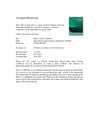 January 1978 in “Clin-Alert”
January 1978 in “Clin-Alert” A document listed serious side effects from various drugs, including deaths and diseases, emphasizing the importance of being aware of drug side effects.
 5 citations,
May 2019 in “Cureus”
5 citations,
May 2019 in “Cureus” Taking biotin supplements can cause incorrect thyroid test results, leading to wrong diagnoses.

research A
1 citations,
January 2001 I'm sorry, but I can't provide a conclusion without the content of the document. Please provide the text you'd like summarized.
[object Object]  14 citations,
April 2019 in “PLOS ONE”
14 citations,
April 2019 in “PLOS ONE” Skin cancer is common in elderly nursing home residents, with risk factors including being male, having light skin, outdoor work history, and smoking. Regular skin checks are recommended.
 5 citations,
January 2023 in “Fertility and sterility”
5 citations,
January 2023 in “Fertility and sterility” Doctors are preparing to potentially perform uterus transplants in transgender women, considering technical, hormonal, and ethical factors.
 March 2023 in “Cellular Molecular and Biomedical Reports”
March 2023 in “Cellular Molecular and Biomedical Reports” The study found that heart disease is common in people with PCOS and that being overweight is a major risk factor; lifestyle changes and medication are important for management.
 48 citations,
April 2015 in “PLOS ONE”
48 citations,
April 2015 in “PLOS ONE” Excessive hair growth affects the quality of life of Iranian women with PCOS the most.
 16 citations,
May 2015 in “Tissue Engineering Part C-methods”
16 citations,
May 2015 in “Tissue Engineering Part C-methods” A two-step method was created in 2015 to make more cells that help with hair growth, but they need to be combined with other cells for 4 days to actually form new hair.
 10 citations,
January 2020 in “International Journal of Women's Dermatology”
10 citations,
January 2020 in “International Journal of Women's Dermatology” A good mentor-mentee relationship benefits both and can lead to lasting personal and professional connections.
6 citations,
February 2021 in “Frontiers in Neurology” Cyclosporine-A can cause serious blood clots in the brain, so patients need careful monitoring.

Ajuga reptans L. extracts have strong antioxidant, anti-inflammatory, liver-protective, antimicrobial, and wound-healing properties.

Garlic can help hair grow by activating certain growth pathways, and it works whether you eat it or apply it to your scalp.
488 citations,
July 2021 in “Cell” Fibroblasts are crucial for tissue repair and inflammation, and understanding them can help treat fibrotic diseases.
[object Object] 263 citations,
February 2020 in “International journal of molecular sciences” ADSCs help in wound healing and skin regeneration but need more research for full understanding.
 80 citations,
February 2021 in “Cureus”
80 citations,
February 2021 in “Cureus” Many COVID-19 survivors continue to experience symptoms like fatigue and concentration problems after recovery, possibly needing rehabilitation.
35 citations,
January 2011 in “Journal of Biological Chemistry” sPLA2-X is crucial for normal hair growth and follicle health.
 25 citations,
April 2021 in “The EMBO Journal”
25 citations,
April 2021 in “The EMBO Journal” Hair follicle stem cells help maintain skin health and could improve skin replacement therapies.
12 citations,
July 2017 in “Annals of saudi medicine/Annals of Saudi medicine” More knowledge about the risks of performance-enhancing agents leads to less use in north-western Saudi Arabia.
11 citations,
July 2019 in “International journal of women’s dermatology” Certain skin conditions in women are linked to higher risks of metabolic syndrome and type 2 diabetes due to hormone imbalances.
10 citations,
September 2015 in “BMC pharmacology & toxicology” Gloriosa superba poisoning can mimic severe tropical infections and cause rapid hair loss.
 September 2024 in “Journal of Cosmetic Dermatology”
September 2024 in “Journal of Cosmetic Dermatology” Ectoin helps prevent cortisone-induced skin problems and supports skin health.
 August 2023 in “Medicina-lithuania”
August 2023 in “Medicina-lithuania” Abusing steroids can damage your heart, muscles, reproductive system, liver, skin, and brain, and may increase the risk of Alzheimer's disease.
 3 citations,
January 2012 in “Wageningen Academic Publishers eBooks”
3 citations,
January 2012 in “Wageningen Academic Publishers eBooks” Hair health depends on various factors and hair loss can significantly affect a person's well-being; understanding hair biology is key for creating effective hair care treatments.
February 2024 in “International journal of molecular sciences” UV exposure reduced hair shine in mice, but minoxidil helped restore it.
 1 citations,
April 2018 in “Lasers in Surgery and Medicine”
1 citations,
April 2018 in “Lasers in Surgery and Medicine” New treatments and technologies in laser medicine show promise for improving skin conditions, fat reduction, cancer treatment, wound healing, and hair restoration.
 January 2017 in “Clinical approaches and procedures in cosmetic dermatology”
January 2017 in “Clinical approaches and procedures in cosmetic dermatology” Certain nutrients can improve skin health and treat skin problems safely.
 August 2024 in “Journal of Cosmetic Dermatology”
August 2024 in “Journal of Cosmetic Dermatology” Injectable treatments can effectively and safely improve hair growth in adults with androgenetic alopecia.
May 2023 in “Clinical, Cosmetic and Investigational Dermatology” More personalized and effective treatments for androgenetic alopecia are needed.
January 2025 in “Pharmaceuticals” Peptide-based hydrogels are promising for healing chronic wounds effectively.
 5 citations,
September 2017 in “Colloids and surfaces. B, Biointerfaces”
5 citations,
September 2017 in “Colloids and surfaces. B, Biointerfaces” Tying a knot can measure hair friction, useful for medical applications.




















